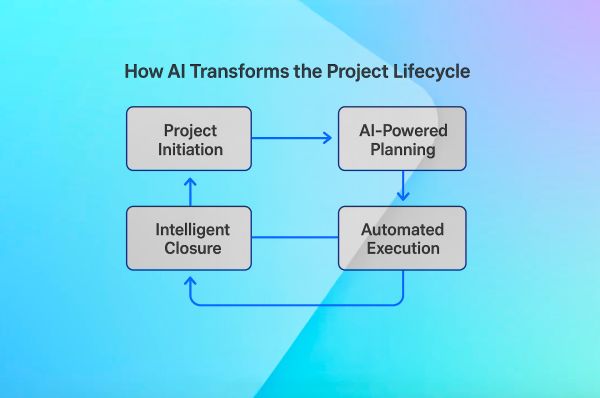
AI project management is revolutionizing how teams plan, execute, and deliver projects. By combining intelligent automation with human expertise, organizations can optimize resources, reduce errors, and accelerate results. Leveraging AI business solutions, companies gain real-time insights, predictive analytics, and workflow automation that empower teams to make smarter decisions and achieve superior project outcomes.
Key Takeaways:
- AI project management integrates predictive analytics, workflow automation, and real-time insights to streamline operations.
- Intelligent tools reduce manual tasks, optimize resource allocation, and improve decision-making accuracy.
- AI enhances team collaboration by providing automated updates, risk assessments, and data-driven recommendations.
- Adoption leads to measurable improvements in project speed, cost control, and strategic alignment.
What Is AI Project Management?
AI project management applies machine learning and automation to planning, scheduling, and execution, helping teams forecast outcomes and reduce manual coordination, as defined by IBM’s overview of AI in business operations. Unlike traditional tools that rely on static data and manual updates, AI-powered platforms continuously analyze performance metrics, identify patterns, and provide intelligent recommendations in real time.
AI’s capabilities include predictive scheduling based on historical performance and resource availability, automated risk detection using pattern recognition, natural language processing for task creation and communication, and real-time forecasting to keep projects aligned with changing conditions.
Core Benefits of AI in Project Management
1. Intelligent Decision-Making
AI systems process large volumes of data and surface insights that help project managers make informed decisions quickly. This includes identifying bottlenecks, optimizing task sequencing, and highlighting resource imbalances before they impact delivery.
2. Predictive Accuracy and Risk Mitigation
Predictive models use historical project data to anticipate potential delays, budget overruns, or resource conflicts. By flagging risks early, organizations can take proactive measures rather than reacting to issues after they occur.
3. Enhanced Team Collaboration
AI tools act as intelligent coordinators, automatically sending status updates, flagging dependencies, and aligning cross-functional teams. This reduces the need for repetitive meetings and manual check-ins.
4. Time and Cost Savings
Automation of routine tasks, such as data entry, reporting, and task assignment, frees project managers to focus on strategic work. Over time, this leads to significant operational efficiency and cost reduction.
Key Features That Drive Results
The effectiveness of AI project management lies in its core features, which bring structure, foresight, and adaptability to every phase.
- Automated Task Allocation: Assigns tasks based on skill set, workload, and availability.
- Smart Scheduling: Dynamically adjusts timelines as priorities shift.
- AI Forecasting Engines: Predicts delivery dates and resource needs with high precision.
- Real-Time Dashboards: Provides instant visibility into progress, risks, and KPIs.
- Natural Language Interfaces: Converts simple commands into structured workflows.
How AI Transforms the Project Lifecycle
The project lifecycle traditionally involves distinct phases—initiation, planning, execution, monitoring, and closure. AI introduces continuous intelligence and automation at each stage.
- Initiation: AI analyzes historical data to build realistic baselines, ensuring more accurate scope definition.
- Planning: Intelligent scheduling engines map dependencies, forecast timelines, and allocate resources automatically.
- Execution: AI platforms handle real-time updates, adjust workflows dynamically, and trigger automation to maintain momentum.
- Monitoring: Predictive analytics detect risks early, surface anomalies, and suggest mitigation strategies without manual intervention.
- Closure: Automated reports compile project insights, capturing lessons learned for future optimization.
Practical Use Cases Across Industries
In technology and software development, AI algorithms optimize sprint planning, forecast release timelines, and automatically track code quality metrics, helping teams stay on schedule and maintain high standards. In construction and engineering, resource allocation tools minimize idle time, while predictive models anticipate delays caused by weather or supply chain disruptions, keeping projects on track.
Marketing and creative teams use AI to manage campaign timelines, streamline content workflows, and track performance in real time, enabling faster iterations and more targeted decision-making. In healthcare and pharmaceuticals, compliance-focused AI systems monitor documentation, automate audits, and flag potential regulatory risks, ensuring accuracy and timeliness in critical projects.
Implementation Strategies for Organizations
Start with data quality by ensuring all information is clean, structured, and standardized, eliminating duplicates before integration to maximize AI effectiveness. Choose the right platform that aligns with organizational needs, integrates smoothly with existing tools, and scales as operations grow.
Train and upskill teams so project managers and team members can confidently leverage AI insights for better decision-making. Pilot before scaling by starting with smaller, controlled projects to measure impact, refine workflows, and build team confidence. Finally, integrate gradually by layering AI capabilities step by step to minimize disruption and ensure a smooth transition from traditional methods.
Challenges and Best Practices
Challenges
- Data silos and inconsistent inputs can limit AI accuracy.
- Cultural resistance may slow adoption.
- Lack of clear KPIs can obscure performance improvements.
Best Practices
- Centralize data sources and enforce governance policies.
- Communicate benefits clearly to secure team buy-in.
- Define success metrics early and track improvements consistently.
The Future of AI in Project Management
AI’s role in project management is set to evolve further, shifting from support functions to strategic orchestration. Emerging trends include generative AI for project documentation and reporting, autonomous project management systems that execute workflows end-to-end, AI copilots integrated into collaboration platforms, and hyper-personalized dashboards tailored to each stakeholder’s priorities.
As adoption grows, AI is shifting from task automation to decision support across the full project lifecycle, a trend also highlighted by Harvard Business Review in its coverage of AI in management.

FAQ
Q1: What is AI project management?
Q2: How can AI improve team collaboration?
Q3: What industries benefit from AI project management?
Q4: How do I implement AI project management in my organization?
Q5: What is the future of AI project management?
Conclusion
AI project management is reshaping how organizations plan, execute, and deliver. By integrating intelligent automation, predictive analytics, and real-time insights, companies can accelerate delivery, reduce costs, and make smarter decisions. Early adopters are already gaining a competitive edge, positioning themselves at the forefront of a new era of efficient, data-driven project execution.
Contact us and learn how you can get ready for the future AI-Powered Business Solutions.